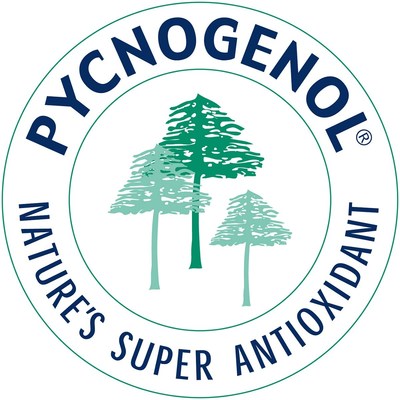HOBOKEN, N.J., March 15, 2017 /PRNewswire/ -- According to the American Heart Association and Go Red for Women, women show an increased risk of cardiovascular disease at the onset of menopause as the body decreases production of estrogen. A new peer reviewed and published study (Belcaro et al, 2017) builds upon previous research showing the benefits of Pycnogenol® for alleviating various perimenopause symptoms and is the first study to show the effects of this standardized French maritime pine bark extract on cardiovascular risk markers, homocysteine and CRP levels.

"Women experience quite a few changes throughout menopause disruptive symptoms like hot flashes, night sweats, and even changes in mood. These changes are usually due to less production of estrogen, which can also lead to a higher risk of cardiovascular disease the number one cause of death in women over the age of 50," said nationally renowned natural health expert and author Dr. Fred Pescatore.
Key findings for millions of perimenopausal women
The results of this new clinical study align with previous research showing reduction of risk factors contributing to cardiovascular disease. In this study and in previous research, Pycnogenol® reduced and normalized elevated cardiovascular risk factors often related to perimenopause: cholesterol, triglycerides, blood pressure and blood glucose.
In the new clinical study, 70 female subjects between the ages of 40 and 50 years of age who reported comparable perimenopause symptoms were assigned to either a control group or a Pycnogenol® group daily supplementation with 100mg Pycnogenol® -- for an 8-week period. All participants were advised to follow a self-improvement routine of exercise, rest and a healthy diet.
Safety was optimal for the researchers. Supplementation with Pycnogenol® was well-tolerated throughout the study. No side effects were reported.
After 8 weeks, the Pycnogenol® group reported significantly reduced perimenopause symptoms and exhibited decreased risk markers of perimenopause-related cardiovascular risks.
- Significant relief of hot flashes (41 percent improvement Pycnogenol®/ 3 percent control)
- Reduction of night sweat (33 percent improvement Pycnogenol®/ 3 percent control)
- Normalization of irregular periods (67 percent improvement Pycnogenol®/ 0 percent control)
- Significant improvement of mood (25 percent improvement Pycnogenol®/ 12 percent control)
Reducing perimenopausal cardiovascular risk
Researchers tested again six months after the initial testing period and found significant reduction of cardiovascular risk indicators, including:
- Significant reduction of cardiovascular risk marker, homocysteine (47 percent improvement Pycnogenol®/ 6 percent improvement control)
- Normalization of systolic blood pressure (8 percent improvement Pycnogenol®/ 3 percent improvement control)
- Significant decrease in C-Reactive Protein levels (60 percent improvement Pycnogenol®/ 2 percent improvement control)
- Reduction of fasting blood glucose (9 percent improvement Pycnogenol®/ 1 percent improvement control)
- Significant reduction of oxidative stress (22 percent improvement Pycnogenol®/ 2 percent improvement control)
- Improvement of triglycerides levels (11 percent improvement Pycnogenol®/ 1 percent improvement control)
This research also advances previous studies indicating Pycnogenol®'s ability to significantly reduce oxidative stress, a key determinant of high CRP levels and inflammation.
"What's really interesting about this study is the drastic improvement of menopause transition symptoms in the Pycnogenol® group. Most women spend about one-third of their lives in menopause and post-menopause so it's important to find safe and effective natural products to manage those troublesome, and sometimes problematic, symptoms," said Dr. Pescatore.
Experts recommend adopting a 'best practice' regimen consisting of a healthy diet and exercise to help manage symptoms of perimenopause, but the study findings for Pycnogenol® are encouraging for women experiencing persistent disruptive symptoms.
Pycnogenol® is a natural plant extract originating from the bark of the maritime pine that grows along the coast of southwest France and is found to contain a unique combination of procyanidins, bioflavonoids and phenolic acids, which offer extensive natural health benefits. The extract has been widely studied for the past 40 years and has more than 340 published studies and review articles ensuring safety and efficacy as an ingredient. Today, Pycnogenol® is available in more than 700 dietary supplements, multi-vitamins and health products worldwide. For more information, visit www.pycnogenol.com.
About Horphag Research (USA) Inc.
Horphag Research (USA) Inc., based in Hoboken, New Jersey, is the North American distributor for Pycnogenol® (pic-noj-en-all) brand French maritime pine bark extract and Robuvit®, French oak wood extract on behalf of Horphag Research. Pycnogenol® and Robuvit® are registered trademarks of Horphag Research Ltd. For its patented ingredient, Pycnogenol®, Horphag Research has been awarded the Frost & Sullivan Excellence in Research Award, Nutraceutical Business & Technology Safety & Quality Award, SupplySide West Scientific Excellence Award and The American Botanical Council's Tyler Research Award. Horphag Research (USA) has the exclusive rights to market and sell Pycnogenol® in North America and benefits from more than 40 years of scientific research assuring the safety and efficacy of Pycnogenol® as a dietary supplement. For more information, visit www.pycnogenol.com and www.robuvit.com.

To view the original version on PR Newswire, visit:http://www.prnewswire.com/news-releases/study-shows-pycnogenol-normalizes-cardiovascular-risk-factors-in-perimenopausal-women-300424170.html
SOURCE Horphag Research (USA) Inc.





